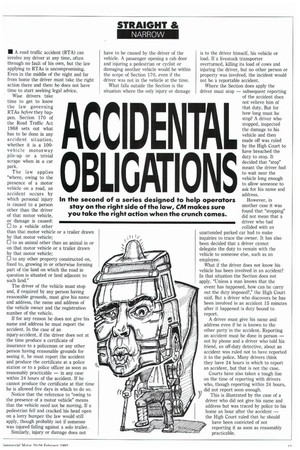CIDEN
Page 45

If you've noticed an error in this article please click here to report it so we can fix it.
BLIGATI
In the second of a series designed to help operators stay on the right side of the law, CM makes sure you take the right action when the crunch comes.
• A road traffic accident (RTA) can involve any driver at any time, often through no fault of his own, but the law applying to RTAs is uncompromising. Even in the middle of the night and far from home the driver must take the right action there and then: he does not have time to start seeking legal advice.
Wise drivers take time to get to know the law governing RTAs before they happen. Section 170 of the Road Traffic Act 1988 sets out what has to be done in any accident situation, whether it is a 100vehicle motorway pile-up or a trivial scrape when in a car park.
The law applies "where, owing to the presence of a motor vehicle on a road, an accident occurs by which personal injury is caused to a person other than the driver of that motor vehicle, or damage is caused. 0 to a vehide other than that motor vehicle or a trailer drawn by that motor vehicle; 0 to an animal other than an animal in or on that motor vehicle or a trailer drawn by that motor vehicle; 0 to any other property constructed on, fixed to, growing in or otherwise forming part of the land on which the road in question is situated or land adjacent to such land."
The driver of the vehicle must stop and, if required by any person having reasonable grounds, must give his name and address, the name and address of the vehicle owner and the registration number of the vehicle.
If for any reason he does not give his name and address he must report the accident. In the case of an injury-accident, if the driver does not at the time produce a certificate of insurance to a policeman or any other person having reasonable grounds for seeing it, he must report the accident and produce the certificate at a police station or to a police officer as soon as reasonably practicable — in any case within 24 hours of the accident. If he cannot produce the certificate at that time he is allowed five days in which to do so.
Notice that the reference to "owing to the presence of a motor vehicle" means that the vehicle need not be moving. If a pedestrian fell and cracked his head open on a lorry bumper the law would still apply, though probably not if someone was injured falling against a solo trailer.
Similarly, injury or damage does not have to be caused by the driver of the vehicle. A passenger opening a cab door and injuring a pedestrian or cyclist or damaging another vehicle would be within the scope of Section 170, even if the driver was not in the vehicle at the time.
What falls outside the Section is the situation where the only injury or damage is to the driver himself, his vehicle or load. If a livestock transporter overturned, killing its load of cows and injuring the driver, but no other person or property was involved, the incident would not be a reportable accident.
Where the Section does apply the driver must stop — subsequent reporting of the accident does not relieve him of that duty. But for how long must he stop? A driver who stopped, inspected the damage to his vehicle and then made off was ruled by the High Court to have breached the duty to stop. It decided that "stop" meant the driver had to wait near the vehicle long enough to allow someone to ask for his name and address.
However, in another case it was found that "stopping" did not mean that a driver who had collided with an unattended parked car had to make inquiries to trace the owner. It has also been decided that a driver cannot delegate the duty to remain with the vehicle to someone else, such as an employee.
What if the driver does not know his vehicle has been involved in an accident? In that situation the Section does not apply. "Unless a man knows that the event has happened, how can he carry out the duty imposed?," the High Court said. But a driver who discovers he has been involved in an accident 15 minutes after it happened is duty bound to report.
A driver must give his name and address even if he is known to the other party in the accident. Reporting an accident must be done in person — not by phone and a driver who told his friend, an off-duty detective, about an accident was ruled not to have reported it to the police. Many drivers think they have 24 hours in which to report an accident, but that is not the case.
Courts have also taken a tough line on the time of reporting with drivers who, though reporting within 24 hours, did not report soon enough.
This is illustrated by the case of a driver who did not give his name and address but was traced by police to his home an hour after the accident — the High Court ruled that he should have been convicted of not reporting it as soon as reasonably practicable.




















































































